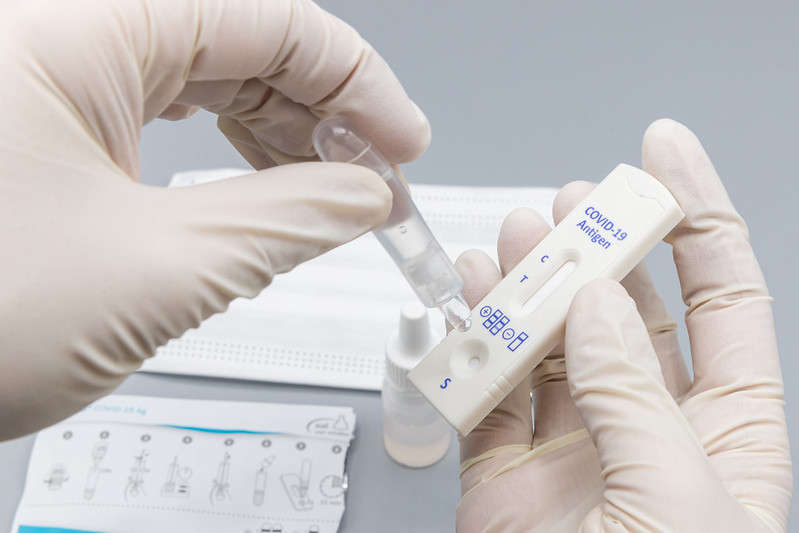Accurate and large-scale testing coupled with a robust contact tracing system have played a central role in the management of the COVID-19 pandemic. In the early days of the pandemic, it was observed that Asia-Pacific countries that were successful in containing the virus had rapid and robust testing in place. As the battle against the pandemic continues, more than a year on since its outbreak, and with more infectious variants in circulation, testing remains crucial to COVID-19 management. Increasing COVID-19 vaccination uptake has encouraged many countries in the region to start to plan to reopen borders and resume economies. Innovative approaches, such as Thailand’s Phuket Sandbox program, have managed to keep infection rates low among international travellers due to a public health response that prioritised increased testing and contact tracing.
The emergence of highly transmissible strains such as the Alpha variant and subsequently the Delta variant, coupled with recent research out of Oxford indicating that even fully vaccinated individuals can carry a viral load similar to unvaccinated individuals, has led to the realisation that initial ideas of herd immunity are no longer valid. Policy makers are now realising that they will have to manage COVID-19 as an endemic disease with ongoing contact tracing capabilities coupled with flexible and scalable testing facilities to help control local outbreaks.
Having a robust testing strategy in place will be crucial as we move towards a new normal and life with COVID-19 as an endemic disease – an approach that was highlighted in a recent APACMed research report. The report outlines three testing types:

The three testing types can be tailored, individually or in combination, to different pandemic scenarios to support the safe resumption of economies in Asia-Pacific, while ensuring that some potential barriers such as costs and repeat testing are addressed.
Aggressive testing was successful in Singapore. Based on learnings from the 2003 SARS outbreak, the island nation adopted an aggressive testing strategy from the onset of the COVID-19 outbreak and had planned to ramp up its testing capabilities in June 2021 to quickly isolate infected clusters and manage the infectious Delta variant. Rapid self-testing kits are also available for purchase in pharmacies to encourage routine testing, with the Singaporean government announcing plans to utilise such rapid tests for pre-event testing to safely restart the economy and return some level of normality to society.
Singapore’s strategy exemplifies the value of diagnostics in managing levels of infections early in the pandemic and throughout the recent wave of infections. This ensures the resilience of the economy, as businesses and social activities can resume without straining healthcare capabilities.
Testing can inform other strategies on the road to recovery, such as travel. The standard practice for travel at present requires a negative pre-departure molecular test taken within 48 hours of departure. The establishment of dedicated testing centres at airports or transport hubs, such as Japan’s Narita Airport, can reduce turnaround times for virus-free certification for travellers. Similarly, a post-arrival testing facility can provide an additional checkpoint for incoming travellers, which further ensures confidence for both travellers and local communities.
At present, a 14-day quarantine stay is required for international arrivals across most of Asia-Pacific. The combination of molecular and antigen tests on staggered days has the potential to reduce quarantine periods, which will likely encourage travel and support people and economies to return to some form of normality.
Policies should consider and address a combination of testing and quarantine to manage risk dynamically, based on the prevalence of disease in the country of origin as well as the management capability in the receiving country. International collaboration and agreements in recognising certified lab results and vaccines will also be crucial in this next step of resuming international travel.
Diagnostic tests also play a critical role in vaccination strategies. Many countries in Asia-Pacific are experiencing vaccine supply shortages, which impact their efforts to quickly vaccinate and protect their populations against infection. Vaccine shortages require countries to adopt prioritisation. Using tests to understand antibody levels and identify groups of people who already possess immunity against COVID-19 can assist in the distribution of vaccine supplies to those communities that need it the most.
Antibody testing also complements vaccine rollout by providing data on long-term vaccine safety and efficacy against different viral strains. This can inform future strategies to manage outbreaks, such as the need to design new vaccines or give booster shots as vaccine efficacy drops over time. A global genomic sequencing capacity is also needed to support the monitoring of the virus genome and early detection of new variants.
The continued surge of cases from the more infectious Delta variant around the region threatens to undermine plans to resume economies. Even though governments are ramping up vaccination efforts, many challenges lie ahead, such as the efficacy of vaccines against new viral strains and the lack of vaccine supplies in Asia-Pacific.
Diagnostic testing continues to play an important role, in addition to vaccination, to control the further spread of the virus and ensure the safe reopening of borders and economies. The region already has access to a wide array of diagnostic tools. The next step is to ensure the right policies are in place to enable implementation and uptake. COVID-19 will likely persist for some time to come, and our preparation to live alongside the virus needs to start today.
Disclosure
This opinion piece is based on a review of the role of diagnostics in COVID-19 management conducted by the Asia Pacific Medical Technology Association (APACMed), which provides a unifying voice for the medical devices and in-vitro diagnostics industry in Asia-Pacific. The review was prepared in conjunction with L.E.K. Consulting. The views are those of the author only.



Leave a Comment